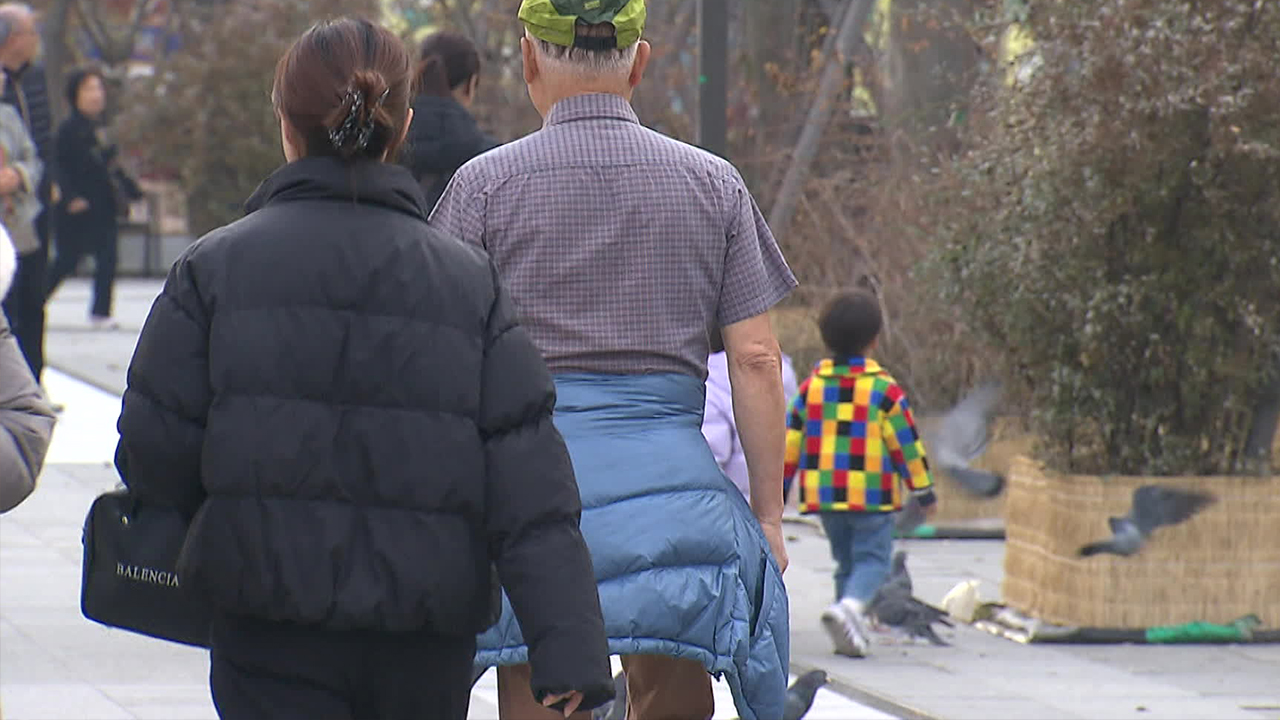Mild winter expected with sharp temperature swings
입력 2024.11.22 (23:42)
읽어주기 기능은 크롬기반의
브라우저에서만 사용하실 수 있습니다.
[Anchor]
This autumn has had an unusually warm number of days.
This winter is also expected to be generally mild, but a sudden cold wave is forecasted to cause significant fluctuations in temperature.
Meteorological specialist Kim Se-hyung reports.
[Report]
In a city park at the end of autumn.
Under the rather bare trees, fallen leaves are piled up.
Winter is just around the corner, but the citizens' clothing remains light, contrary to the season's pace.
[Hwang Ji-yeon/Dongjak-gu, Seoul: "I originally had a lot of padded jackets in my closet, but now it's slightly pushed aside. Since about 2-3 days ago, the weather has suddenly warmed up, giving a feeling that it's almost spring..."]
Following an unusually warm autumn, this winter's temperatures are also expected to be similar to or higher than average.
The Korea Meteorological Administration predicts that temperatures in December and January will be similar to the average, while February of next year is likely to be warmer than usual.
This is because the sea surface temperatures in the northwestern Pacific and the Indian Ocean are maintaining higher than average levels, allowing warm southern winds to frequently blow towards the Korean Peninsula.
However, if we look closely at the daily temperatures from December to January, they are expected to fluctuate greatly like a roller coaster.
[Jo Kyung-sook/Head of Climate Prediction Division, Korea Meteorological Administration: "Currently, there is less sea ice in the Arctic Ocean, which can lead to the influx of cold air into our country. Therefore, while we may experience mild weather, there could also be strong cold waves..."]
Next Wednesday, cold wind is expected to cause a significant drop in temperature, with the first snow forecasted in various inland areas.
The Korea Meteorological Administration anticipates that this winter will frequently be influenced by high pressure, with precipitation expected to be similar to or generally lower than average.
This is KBS News, Kim Se-hyun.
This autumn has had an unusually warm number of days.
This winter is also expected to be generally mild, but a sudden cold wave is forecasted to cause significant fluctuations in temperature.
Meteorological specialist Kim Se-hyung reports.
[Report]
In a city park at the end of autumn.
Under the rather bare trees, fallen leaves are piled up.
Winter is just around the corner, but the citizens' clothing remains light, contrary to the season's pace.
[Hwang Ji-yeon/Dongjak-gu, Seoul: "I originally had a lot of padded jackets in my closet, but now it's slightly pushed aside. Since about 2-3 days ago, the weather has suddenly warmed up, giving a feeling that it's almost spring..."]
Following an unusually warm autumn, this winter's temperatures are also expected to be similar to or higher than average.
The Korea Meteorological Administration predicts that temperatures in December and January will be similar to the average, while February of next year is likely to be warmer than usual.
This is because the sea surface temperatures in the northwestern Pacific and the Indian Ocean are maintaining higher than average levels, allowing warm southern winds to frequently blow towards the Korean Peninsula.
However, if we look closely at the daily temperatures from December to January, they are expected to fluctuate greatly like a roller coaster.
[Jo Kyung-sook/Head of Climate Prediction Division, Korea Meteorological Administration: "Currently, there is less sea ice in the Arctic Ocean, which can lead to the influx of cold air into our country. Therefore, while we may experience mild weather, there could also be strong cold waves..."]
Next Wednesday, cold wind is expected to cause a significant drop in temperature, with the first snow forecasted in various inland areas.
The Korea Meteorological Administration anticipates that this winter will frequently be influenced by high pressure, with precipitation expected to be similar to or generally lower than average.
This is KBS News, Kim Se-hyun.
■ 제보하기
▷ 카카오톡 : 'KBS제보' 검색, 채널 추가
▷ 전화 : 02-781-1234, 4444
▷ 이메일 : kbs1234@kbs.co.kr
▷ 유튜브, 네이버, 카카오에서도 KBS뉴스를 구독해주세요!
- Mild winter expected with sharp temperature swings
-
- 입력 2024-11-22 23:42:13

[Anchor]
This autumn has had an unusually warm number of days.
This winter is also expected to be generally mild, but a sudden cold wave is forecasted to cause significant fluctuations in temperature.
Meteorological specialist Kim Se-hyung reports.
[Report]
In a city park at the end of autumn.
Under the rather bare trees, fallen leaves are piled up.
Winter is just around the corner, but the citizens' clothing remains light, contrary to the season's pace.
[Hwang Ji-yeon/Dongjak-gu, Seoul: "I originally had a lot of padded jackets in my closet, but now it's slightly pushed aside. Since about 2-3 days ago, the weather has suddenly warmed up, giving a feeling that it's almost spring..."]
Following an unusually warm autumn, this winter's temperatures are also expected to be similar to or higher than average.
The Korea Meteorological Administration predicts that temperatures in December and January will be similar to the average, while February of next year is likely to be warmer than usual.
This is because the sea surface temperatures in the northwestern Pacific and the Indian Ocean are maintaining higher than average levels, allowing warm southern winds to frequently blow towards the Korean Peninsula.
However, if we look closely at the daily temperatures from December to January, they are expected to fluctuate greatly like a roller coaster.
[Jo Kyung-sook/Head of Climate Prediction Division, Korea Meteorological Administration: "Currently, there is less sea ice in the Arctic Ocean, which can lead to the influx of cold air into our country. Therefore, while we may experience mild weather, there could also be strong cold waves..."]
Next Wednesday, cold wind is expected to cause a significant drop in temperature, with the first snow forecasted in various inland areas.
The Korea Meteorological Administration anticipates that this winter will frequently be influenced by high pressure, with precipitation expected to be similar to or generally lower than average.
This is KBS News, Kim Se-hyun.
This autumn has had an unusually warm number of days.
This winter is also expected to be generally mild, but a sudden cold wave is forecasted to cause significant fluctuations in temperature.
Meteorological specialist Kim Se-hyung reports.
[Report]
In a city park at the end of autumn.
Under the rather bare trees, fallen leaves are piled up.
Winter is just around the corner, but the citizens' clothing remains light, contrary to the season's pace.
[Hwang Ji-yeon/Dongjak-gu, Seoul: "I originally had a lot of padded jackets in my closet, but now it's slightly pushed aside. Since about 2-3 days ago, the weather has suddenly warmed up, giving a feeling that it's almost spring..."]
Following an unusually warm autumn, this winter's temperatures are also expected to be similar to or higher than average.
The Korea Meteorological Administration predicts that temperatures in December and January will be similar to the average, while February of next year is likely to be warmer than usual.
This is because the sea surface temperatures in the northwestern Pacific and the Indian Ocean are maintaining higher than average levels, allowing warm southern winds to frequently blow towards the Korean Peninsula.
However, if we look closely at the daily temperatures from December to January, they are expected to fluctuate greatly like a roller coaster.
[Jo Kyung-sook/Head of Climate Prediction Division, Korea Meteorological Administration: "Currently, there is less sea ice in the Arctic Ocean, which can lead to the influx of cold air into our country. Therefore, while we may experience mild weather, there could also be strong cold waves..."]
Next Wednesday, cold wind is expected to cause a significant drop in temperature, with the first snow forecasted in various inland areas.
The Korea Meteorological Administration anticipates that this winter will frequently be influenced by high pressure, with precipitation expected to be similar to or generally lower than average.
This is KBS News, Kim Se-hyun.
-
-

김세현 기자 weather@kbs.co.kr
김세현 기자의 기사 모음
-
이 기사가 좋으셨다면
-
좋아요
0
-
응원해요
0
-
후속 원해요
0















이 기사에 대한 의견을 남겨주세요.